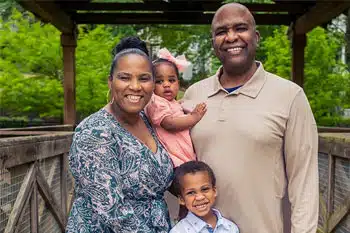
Shifting to a new home can be physically and emotionally challenging for children. After joining their new family, adopted children need a complete health checkup. This checkup should include examining their medical records and completing a physical exam. Then, the doctor can diagnose and treat any medical, developmental, or behavioral issues.
Adoption Medicine: Your Child’s Initial Checkup
The checkup should cover age-appropriate screenings such as tests for newborns, hearing, vision, dental care, and assessments for behavior and development. Then, the doctor may order tests based on the child’s history and living conditions before they were adopted. If necessary, the child may need to see other medical specialists. The American Academy of Pediatrics has advised adoptive parents to ensure their children receive a comprehensive medical evaluation.
“We can make a profound difference with a family that’s open to and takes advantage of all the services we offer,” says pediatric nurse Karen Belcher, clinical program coordinator for the UAB International Adoption Clinic at Children’s of Alabama.
Adoption medicine clinics, connected to major medical centers, offer a wide range of specialized care by bringing together experts like doctors, social workers, psychologists, physical therapists, and surgeons. These professionals collaborate to support the health and well-being of both children and adoptive families. Many of the staff members have personal ties to adoption—whether as adoptive parents or adoptees themselves—adding a unique depth of understanding and empathy to the care they provide.
Prenatal Exposure and Trauma
In adoption medicine clinics, parents can receive information about the mental and behavioral health issues that can result from experiencing adverse childhood events, trauma, or being exposed to drugs or alcohol in the womb. This knowledge can be valuable for understanding and addressing potential challenges.
“We know that these children have had a little rockier start in life than the average person,” says Dr. Judith Eckerle, the Director at the University of Minnesota’s Adoption Medicine Clinic in a story for U.S. News. “Most of the time, love is not enough.” They may need ongoing therapy or specialized training, for example.
“If you are a pregnant mom and you are living with an elevated cortisol level, your baby’s brain is taking a bath in cortisol,” which can negatively impact brain development, she says.
On top of that, issues like housing instability, neglect, malnutrition, and lack of early parent-child bonding can produce some steep consequences. These include anxiety, trouble self-regulating, and learning challenges. To help the child succeed, professionals at adoption medicine clinics will address these issues.
Easing the Transition
“Kids with these prenatal exposures are at risk for learning disabilities and attention deficit disorder,” Julia Bledsoe, director of the Center for Adoption Medicine at the Pediatric Care Center at the University of Washington Medical Center, says. “And if you’re taken into foster care because of birth parent addiction, then there is also a risk that you have experienced neglect or witnessed violence, sexual abuse, or emotional abuse. Those things, too, can influence both brain development and attachment to a primary caregiver.”
Adoptive parents can leave adoption medicine clinics with techniques for making the transition as smooth as possible. For instance: “General pediatrics would tell a family most of the time that kids should sleep in their own room. We say bring them into your room – they need safety, nurturing, and connection,” says pediatric nurse Karen Belcher, clinical program coordinator for the UAB International Adoption Clinic at Children’s of Alabama.
This may affect how quickly a child attaches to their adoptive parents, which “can be life-changing.” Until the child has a sense of security and attachment to the adoptive parents, they may be advised to restrict the number of people involved in the child’s care.
“I’m routinely shocked at how much we can do for kids,” Eckerle says, “and how much progress they can make in a family once we clear the path for them and get them into a loving, stable environment.”
The Comprehensive Child Wellness Assessment
Comprehensive Child Wellness Assessment (CCWA) is a 60 to 90-minute clinic assessment where a child will be seen by a pediatrician, occupational therapist, and child psychologist. Each CCWA may include:
- Head-to-toe physical examination
- Review of medical history
- Medical screening for fetal alcohol spectrum disorders (FASDs)
- Developmental screening
- Mental health risk & assessment
- Lab work to screen for underlying medical conditions
- Oral health assessments
- Referral & resource support for specialty services
- Continued follow-up
At an adoption medicine clinic, a healthcare provider can present you with a full range of physical and neurophysical evaluations. They can also diagnose and treat issues common with adopted children, including developmental delays, nutritional deficiencies, and problems with growth. Their treatment can include:
- Immunization management
- Treatment for growth and nutritional deficits
- Handling behavioral issues
- Fetal alcohol syndrome screening
- Educating parents, adoption professionals, and medical providers
U.S. Adoption Medicine Clinics & Practitioners
The National Council for Adoption (NCFA) provides this list of adoption medicine clinics and practitioners as a courtesy. Just a heads up – this list doesn’t cover all adoption and foster care medicine practitioners in the US, and it’s not meant to recommend any specific providers.
Alabama:
Birmingham: The Adoption & Foster Care Clinic
Minnesota:
Minneapolis: University of Minnesota Adoption Medicine Clinic
Rochester: Mayo Clinic Perinatal Education’s Adoptive Parenting Class
New York:
Bronx: Adoption Medicine Program at The Children’s Hospital at Montefiore
Ohio:
Cincinnati: Cincinnati Children’s International Adoption Center
Pennsylvania:
Philadelphia: The International Adoption Health Program at Children’s Hospital of Philadelphia
Pittsburgh: Dr. Sarah Springer at Kids Plus Pediatrics
Texas:
Houston: The Foster Care Clinic at Texas Children’s Hospital
Washington:
Seattle: Center for Adoption Medicine at Seattle Children’s Hospital
Founder of Lifetime Adoption, adoptive mom, adoption expert, and Certified Open Adoption Practitioner (C.O.A.P).
Since 1986, adoption expert Mardie Caldwell has been dedicated to bringing couples and birth parents together in order to fulfill their dreams.
“Many years ago, I was also searching for a child to adopt. We didn’t know where or how to get started. Through research, determination, and a prayer, our dream of a family became reality. I started with a plan, a notebook, assistance from a caring adoption consultant and a lot of hard work; this was my family I was building. We had a few heartaches along the way, but the pain of not having children was worse!
Within weeks we had three different birth mothers choose us. We were overwhelmed and delighted. Many unsettling events would take place before our adoption would be finalized, many months later. Little did I know that God was training and aligning me for the adoption work I now do today. It is my goal to share with our families the methods and plans which succeed and do not succeed. I believe adoption should be affordable and can be a wonderful “pregnancy” for the adoptive couple.
I have also been on both sides of infertility with the loss of seven pregnancies and then conceiving by new technology, giving birth to a healthy daughter. I have experienced first-hand the emotional pain of infertility and believe my experience allows me to serve your needs better.
It is my hope that for you, the prospective parents, your desire for a child will be fulfilled soon.”





0 Comments